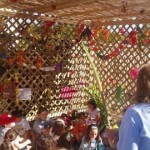#12 Holiday Explorer: Sukkot – The Festival of Booths
#12 Sukkot – The Festival of Booths
In this lesson you will learn about Sukkot, the week-long Jewish harvest festival that occurs in the Fall (usually in Sept or Oct). You will study it’s history and it’s practices and learn why Sukkot is also called, “the festival of ingathering.”
#1 SUKKOT VOCABULARY:
Sukkah: A temporary booth that symbolizes the dwelling shelters of the Israelites who travelled for 40 years in the desert.
Arbah Minim: The “four spices” that naturally grow in Israel (lulav, etrog, hadas, and aravah
Lulav: a large palm that is shaped like a person’s spine, reminding us to stand tall in life
Etrog: citrus fruit that is shaped like a heart (looks similar to a lemon).
Chag HaAsif: “The festival of Ingathering” AKA Sukkot. Sukkot is a thanksgiving holiday that marks the end of the agricultural season and when the final crops are harvested. We shake the lulav and etrog in six directions in gratitude for nature and the fruits of the earth.
#2. WATCH – LEGO Sukkot 101
#3 QUESTION: HOW DO YOU BUILD A SUKKAH?
#4 READ THIS
 “You shall hold a festival for the Eternal One seven days in the place where the Eternal will show you. For the Eternal One will bless all your crops and all your undertakings and you shall have nothing but joy!” – Deuteronomy 15 and Exodus 23.
“You shall hold a festival for the Eternal One seven days in the place where the Eternal will show you. For the Eternal One will bless all your crops and all your undertakings and you shall have nothing but joy!” – Deuteronomy 15 and Exodus 23.
The books of Exodus and Deuteronomy come from the Torah. They are two of the Five books of Moses.
#5. WATCH – Sing Along!
#6 RESPOND AND REACT
1. What is the citrus fruit used during Sukkot?
2. Combine the myrtle plant and a palm and what do you get?
3. What is the “roof” material that is an alternative to a fixed roof?
4. Why do Jewish people shake the lulav in six different directions?
5. What is the other biblical name for Sukkot and why is this name important?
Need some help?
We’re here for you. At any time, if you have any questions, please contact one of our teachers so we can help you.
Also, at the end of the session, remember to review your responses in your Tamid Workbook so you can get credit for this lesson. Behatzlacha (Hebrew for good luck)!
You can reach us at (646)360-0689 or connect@tamidnyc.org

